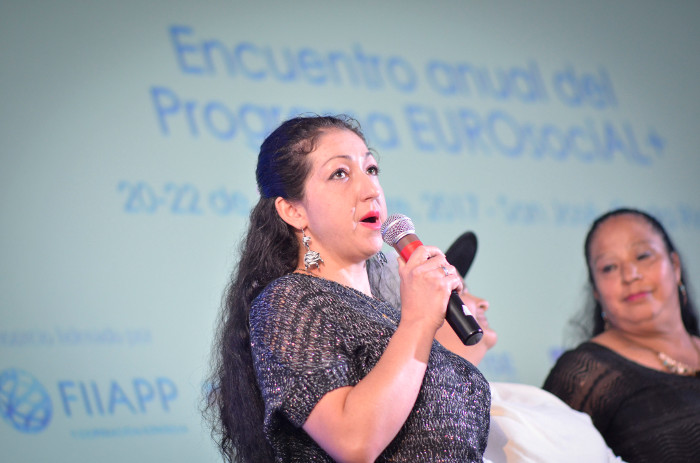-
07 December 2017
Category : Inf first person
EUROsociAL+, looking for answers
If one thing characterises EUROsociAL+, it is seeking answers to the questions posed by Latin America

“When we had the answers, they changed the questions”, said Pelayo Castro referring to a graffito discovered by the Ecuadorian poet Jorge Enrique Adoum and made universal by the Uruguayan writer Mario Benedetti. This catch-phrase, quoted by the European Union Ambassador in Costa Rica at the opening of the EUROsociAL+ meeting in San José, laid the foundation for the three days of discussions and exchanges in the capital of Costa Rica.
Because, if one thing characterises EUROsociAL+, it is seeking answers to the questions raised by Latin America. The answers are to be found in Europe and in Latin America, and in Costa Rica they were transformed into reality with significant commitments to fighting gender violence, social dialogue and regional development.
Also, in this third stage of the Latin American social cohesion programme, we would like to be part of the answers. This means being more strategic, once again placing social issues on the European-Latin American cooperation agenda and contributing to ensuring that countries meet the Sustainable Development Goals. This is why we demanded even more strongly that actions be implemented to support public policies that have a real effect on reducing the inequality gap in the region.
The initial meeting was not only inspiring because of the discussions, it also presaged an unforgettable cultural moment that occurred during the first annual meeting of the third stage of EUROsociAL. Creativity laboratories gave a voice to the different realities existing in the Latin American countries through children and young people at risk of exclusion, the struggle of the LGBT community, and the situation of those who are in detention, who, through poetry, painting and photography expressed their wish to be part of a society that offers them the same rights and the same opportunities as anyone else.
It was a meeting filled with symbols, from the word Freedom, which was the name given to the Metropolitan Park where the meeting began, to the former prison known as “La Peni”, which has now become the Children’s Museum and which we visited on the occasion of Universal Children’s Day. The best way, therefore, to end these lines is the prologue written by Kennly Garza, subdirector of the Vilma Curling Comprehensive Care Centre, for the book of poems written by the inmates of this prison, entitled “Luna compartida” (Shared Moon). In the prologue, entitled “Alquimistas de significados” (Alchemists of meaning), Kennly calls our attention to some of these allegories: “A women’s prison is an uncomfortable, antagonistic place; the unsuspected arrival of cherubim brings on a smile. At the back, the whispers of five hundred writers disturb our conscience when we know we are part of these stories. A scene of losses and grievances, it is also an island of warrior women whose stories deserve to be told before the River Cañas claims its own. Until then, here is the tribute of their words, transparent and direct, warning that while there are women in prison writing about inequality, talking about freedom will never be easy or commonplace, it is an urgent debt that only applause does not endorse”.
Enrique Martínez is the communications manager for the EUROsociAL+ programme
The views and opinions expressed in this blog are the sole responsibility of the person who write them.




